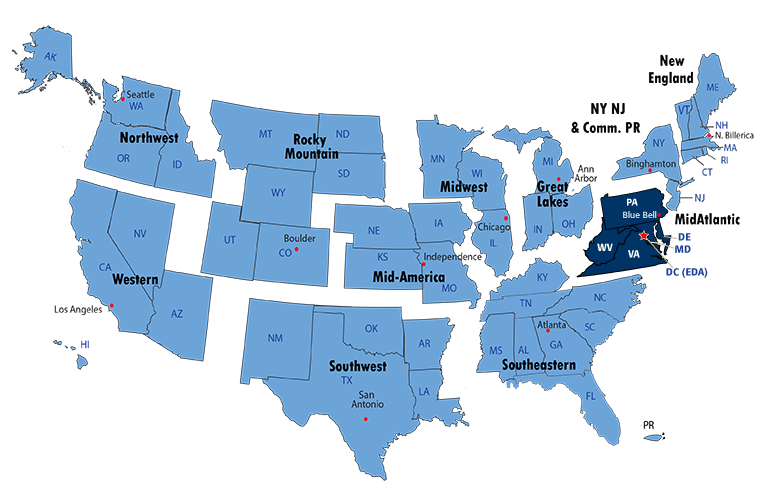The Trade Adjustment Assistance for Firms (TAAF) Program Mission
The TAAF program’s mission is to help import-impacted U.S. firms develop and implement projects to regain global competitiveness, expand markets, strengthen operations, increase profitability, and increase U.S. jobs.
MidAtlantic Trade Adjustment Assistance Center (MATAAC) has been chartered by the Economic Development Administration of the U.S. Department of Commerce with responsibility for the management of Trade Adjustment Assistance for Firms (TAAF) program.

What is Trade Adjustment Assistance for Firms (TAAF)?
The Trade Adjustment Assistance for Firms (TAAF) program was established by Congress under the Trade Expansion Act of 1962. The Trade Act of 1974 (Trade Act), as amended, included a more extensive TAAF program that expanded eligibility, increased authorized funding levels, and provided greater flexibility for a firm to be certified eligible for assistance.
A nationwide network of 11 university-affiliated or non-profit Trade Adjustment Assistance Centers (TAACs) provide technical assistance to help U.S. firms in all 50 states, the District of Columbia, and the Commonwealth of Puerto Rico.
Cost-Sharing Technical Assistance for Business Recovery
Eligible import-impacted U.S. firms can receive direct technical assistance to create and implement targeted business recovery plans. Then, assistance is provided through matching funds provided to the TAACs. This matches the costs for third-party consultants to help firms expand markets, strengthen operations, and increase competitiveness. As part of the program, firms contribute a matching share to create and implement their respective recovery plan. Funds are paid directly to consultants and not provided directly to firms.
Through EDA’s partnership with the TAACs, firms receive customized assistance from industry experts and consultants knowledgeable about the unique needs, challenges and opportunities facing industries in their respective regions.
Program Phases
Phase 1
Petition for Certification
Phase 2
Business Recovery Planning
Phase 3
Project Implementation and Consultants
The Business Recovery Plan
TAACs work closely with company management, after the company’s Petition for Certification has been approved, to identify the firm’s strengths, weaknesses, opportunities, and industry threats, as well as complete a full company diagnostic review, in order to develop a customized Business Recovery to stimulate recovery plan designed and growth.
The TAAF program pays up to 75% of the costs of developing this Business Recovery Plan. When EDA approves the plan, company management and MATAAC jointly identify consultants with specific expertise to assist the firm. The program pays up to 75% in matching funds for the costs of these consultants when implementing knowledge-based projects outlined within the Business Recovery Plan.
Common TAAF Consulting Projects
Common projects include initiatives to improve marketing strategies, upgrade production processes, enhance information technology systems, implement quality control measures, develop new product lines, optimize supply chains, and bolster workforce training programs, all aimed at increasing a company’s competitiveness in the face of import competition.
Developing new marketing campaigns, expanding market reach, improving customer relationship management (CRM) systems, and market research to identify new opportunities.
- Market Research
- Marketing and Sales Strategy
- Advertising and Sales
- Promotion Development
- Distribution Analysis & Development
- Distributor or Sales Representative Search
- Sales Force Management
- Analysis of Competition
- Export Development
- Customer Service Analysis
- Product Line Evaluation
- Website Development
Streamlining production processes, implementing lean manufacturing techniques, and optimizing inventory management. These projects are designed to improve a firm’s manufacturing and engineering processes.
- ISO/QS 9000 Preparation & Registration
- Manufacturing Technology Review
- Process Engineering
- Inventory Management
- Work Methods and Standards
- CAD/CAM Selection and Implementation
- Operations Analysis
- Productivity Improvement
- Statistical Process Control
- Facility & Equipment Review, Selection & Layout
- Material Handling Methods
Implementing new software systems for data analysis, integrating advanced manufacturing technologies like automation, and improving cybersecurity measures.
- Hardware and Software Evaluation
- Custom Programming
- Electronic Data Interchange
- E-Commerce
- System Conversion / Enhancements Analysis
- Integrated Manufacturing Systems
- Office Automation
- Cybersecurity
Researching and developing new products or enhancing existing ones to meet changing market demands.
- Product Design & Testing
- Product Development
- Product Certification
- Product Patients
- Production Planning, Scheduling & Control
Implementing quality control procedures, obtaining industry certifications, and improving product quality standards.
- Quality Assurance / Quality Management
- Lean Manufacturing
- Six Sigma
Providing employee training programs to upskill the workforce on new technologies and industry best practices.
- Training Programs
- Mentoring Programs
- Skills Audits
- Human Resources Planning & Executive Search
- Compensation and Incentive Programs
- Succession Planning
- Customized Training Program Development
Improving financial reporting and analysis, optimizing cash flow, and developing strategic financial plans.
- Profit planning, Cash Management, Budgeting
- Cost Management
- Strategic Planning
- Organizational Analysis
- Debt Restructuring
- Expansion, Diversification & Divestiture Studies
Who Is Eligible for Assistance?
U.S. firms that have experienced a decline in sales and employment may be eligible for the Trade Adjustment Assistance for Firms (TAAF) program. There are variations to these qualifications as outlined in the Trade Act that may increase your firm’s potential eligibility. Declines in sales could be based upon units or dollars. Declines in employment could be actual, impending or based on declines in work hours. MATAAC will help you to determine what TAAF program qualifications and guidelines will apply to your company’s circumstances.
TAAC Locations
- Great-Lakes
- Mid-America
- MidAtlantic
- Midwest
- New England
- Northwest
- NY NJ & Comm. PR
- Rocky Mountains
- Southeastern
- Southwest
- Western
